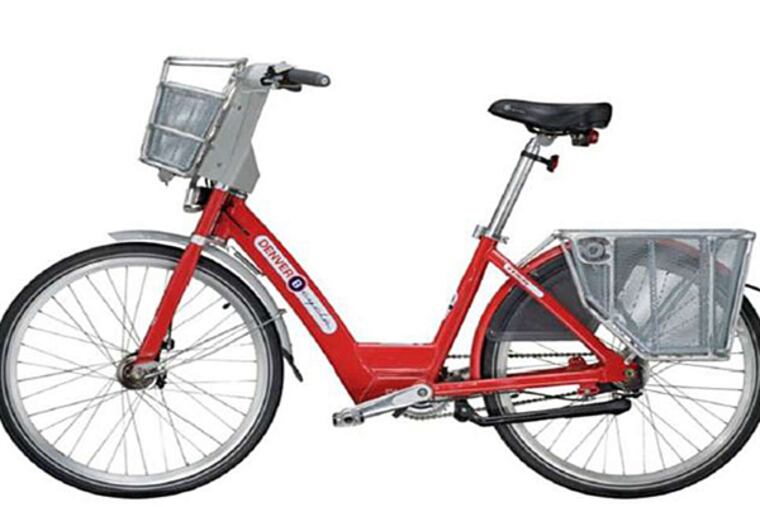Bike-share not coming to Phila. till spring
PHILADELPHIA The bad news for Philadelphia bicyclists: A bike-sharing program, like ones other cities have, won't be launched here this fall, as previously hoped.

PHILADELPHIA The bad news for Philadelphia bicyclists: A bike-sharing program, like ones other cities have, won't be launched here this fall, as previously hoped.
The good news: Officials plan to announce Thursday that it will happen next spring.
Mayor Nutter's office has chosen the contractors who will operate the fledgling system. B-Cycle, a Wisconsin-based firm that supplies bike-share systems around the nation, plans to provide 1,800 bikes and 185 stations for Philadelphia. A local firm, Bicycle Transit Systems, will head planning and operation, while Front Row Marketing Services, a subsidiary of Comcast-Spectacor, is to market the system's sponsorship, the city will announce.
"Philadelphia is my hometown, and I could not be more proud and excited about the team we have to deliver and operate a world-class bike-share system for Philadelphia," Alison Cohen, president of Bicycle Transit Systems, said in a statement. Cohen is also director of bike share services for Toole Design Group, which helped design the program's business plan last year.
Officials pushed back the launch to spring citing desires to bring the bikes out for nicer weather. "Our concern is with the six-month lead time," Nutter said Wednesday. He said public enthusiasm might have waned in the winter after a fall launch.
"I've been talking about a bike share for years. If we could have had this conversation a year ago, we could have bikes in spring 2014," Nutter said. "Bottom line: We weren't ready."
The city won't cover the operating costs, but plans to make a $3 million capital investment. Officials also hope to raise up to $12 million from state and federal grants and private sponsors, said Andrew Stober, chief of staff for Nutter's Office of Transportation and Utilities. His office is awaiting word on a $1.5 million grant application and a "significant foundation contribution" that he declined to name.
The funding mix differs from New York City's bike sharing, which relies entirely on private sources. Nutter said the fact that grants and sponsors were still being sought was no issue. "We have the funding we need to launch a program," he said.
Bicycle Transit Systems and B-Cycle are bringing in their own employees to run and maintain the program. "Their systems have always been launched on time," Stober said. "We're excited to pick a provider that hasn't had any technical glitches."
Other cities have had some. A Montreal-based bike-share firm went bankrupt in January. New York's Citi Bike endured software troubles in its first months.
B-Cycle uses heavy, single-speed cruiser bikes, with oversize aluminum frames, hand brakes, and front baskets. The bikes electronically lock into stations that are mostly solar-powered. Private sponsors get to decide on color schemes and logos for bikes and stations.
The heavier, bigger bike design, with custom hardware, is to discourage theft and "feel really sturdy," Stober said.
Nutter said Philadelphians could expect to see him on a bike-share bike - "though maybe not all the time."
Bike-sharing "is for trips that are three miles or less," Stober said. "It's good for trips where it's too far to walk, too far for transit, or too hard to park." He noted that many bike stations would be near transit lines, but that the system was also meant to offer bikes where public transit wasn't easily available.
To encourage shorter trips, riders who pay annual fees get to ride free for the first 30 minutes - a rule used elsewhere. Then the per-ride fees mount up - a move that the city says will discourage riders from keeping bikes overnight.
The projected cost is $14.5 million over the first five years. The goal is to get all the operating costs back in user fees by 2017, when the program's second phase is to begin.
In the first phase, 60 stations offering 600 bikes are to open in Center City and beyond - roughly from Temple University to just south of Washington Avenue, and from 42d Street to the Delaware River. The second phase will add territory in each direction, plus 650 more bikes.
Stober said annual and monthly passes would be available. Users won't have to pay by credit card - a rule intended to give more low-income riders access.
Though Philadelphia is ranked among the nation's top 20 bike-friendly cities by Bicycling magazine, dozens of other cities already have bike-sharing. The mayor said that could be a plus in the long run.
"There is something to be said for being in the second or third wave," Nutter said. "We get the benefit of learning from others' mistakes."
Alex Doty, head of the Bicycle Coalition of Greater Philadelphia, agreed. "You can't just say, 'I want the system that Minneapolis has,' " he said. "I think Philadelphia has done a very good job of investigating what other cities have done, trying to learn from other people's positive and negative experiences."
301-503-5429